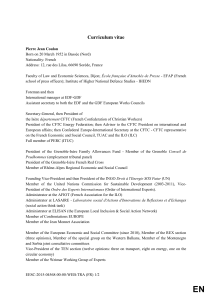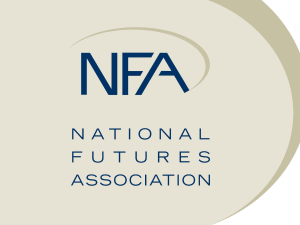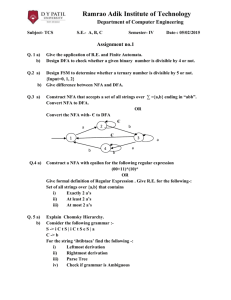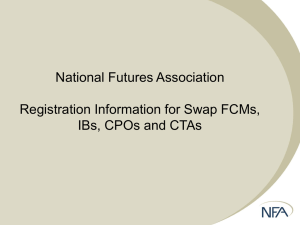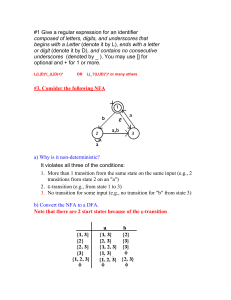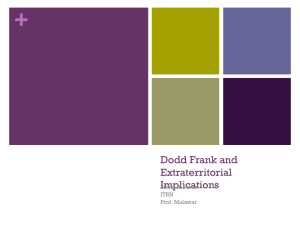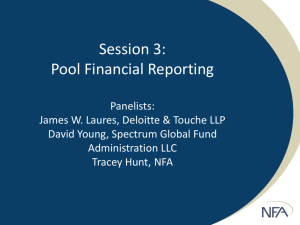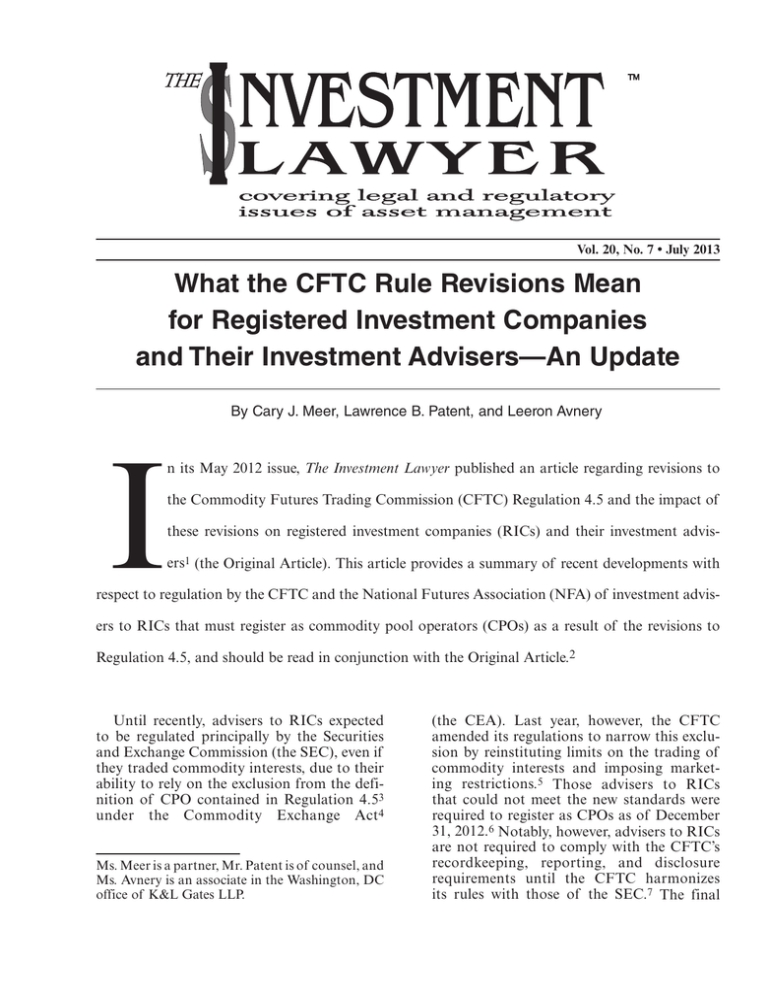
Vol. 20, No. 7 • July 2013
What the CFTC Rule Revisions Mean
for Registered Investment Companies
and Their Investment Advisers—An Update
By Cary J. Meer, Lawrence B. Patent, and Leeron Avnery
I
n its May 2012 issue, The Investment Lawyer published an article regarding revisions to
the Commodity Futures Trading Commission (CFTC) Regulation 4.5 and the impact of
these revisions on registered investment companies (RICs) and their investment advisers1 (the Original Article). This article provides a summary of recent developments with
respect to regulation by the CFTC and the National Futures Association (NFA) of investment advisers to RICs that must register as commodity pool operators (CPOs) as a result of the revisions to
Regulation 4.5, and should be read in conjunction with the Original Article.2
Until recently, advisers to RICs expected
to be regulated principally by the Securities
and Exchange Commission (the SEC), even if
they traded commodity interests, due to their
ability to rely on the exclusion from the definition of CPO contained in Regulation 4.53
under the Commodity Exchange Act4
Ms. Meer is a partner, Mr. Patent is of counsel, and
Ms. Avnery is an associate in the Washington, DC
office of K&L Gates LLP.
(the CEA). Last year, however, the CFTC
amended its regulations to narrow this exclusion by reinstituting limits on the trading of
commodity interests and imposing marketing restrictions.5 Those advisers to RICs
that could not meet the new standards were
required to register as CPOs as of December
31, 2012.6 Notably, however, advisers to RICs
are not required to comply with the CFTC’s
recordkeeping, reporting, and disclosure
requirements until the CFTC harmonizes
its rules with those of the SEC.7 The final
therefrom. For this purpose, “commodity
interests” include any futures contract, including a security futures contract, an option on
a futures contract, a swap (other than a
security-based swap), a leverage transaction,
and any retail foreign exchange transaction.13
On July 10, 2012, the SEC and the CFTC jointly
adopted several final rules and provided interpretive guidance with respect to the definitions
of the terms “swap,” “security-based swap,”
“security-based swap agreement,” and “mixed
swap.” 14 These regulations became effective on
October 12, 2012, and were applied to the definition of a CPO for purposes of determining
whether the operator of a RIC must register as
such as of December 31, 2012.15
With respect to this new inclusion of swaps
as commodity interests, the Original Article
discussed the proposed determination issued
by the Department of the Treasury that would
exempt foreign exchange swaps and foreign
exchange forwards from the definition of
“swaps” for this purpose.16 On November 20,
2012, the Treasury finalized this determination, such that certain foreign exchange
forwards and foreign exchange swaps are no
longer considered “swaps” for purposes of
determining whether the operator of a RIC
must register with the CFTC.17 In order for an
exchange of foreign currencies in the forward
market to be considered a foreign exchange
forward or foreign exchange swap, however,
there must be an actual exchange of two different currencies.18 In other words, if the contract
is cash settled in a single currency, it is not a
foreign exchange forward or foreign exchange
swap. Thus, non-deliverable forwards (NDFs)
are still treated as commodity interests for this
purpose because they do not meet the requirement that there be an actual exchange of two
different currencies.
On February 26, 2013, the ICI, ICI Global,
the American Bankers Association, and the
ABA Securities Association (the NDF Parties)
petitioned the CFTC to exempt NDFs from
certain aspects of swap regulation under
the CEA, so that they are regulated in the
same manner as foreign exchange forwards
and foreign exchange swaps (which, as discussed above, are now generally excluded
from the definition of “swap”).19 The NDF
Parties assert in their petition that NDFs
harmonization release is expected to be issued
by the CFTC shortly.
I. Developments
A. Lawsuit Challenging Amendments
to CFTC Regulation 4.5
In April 2012, the Investment Company
Institute (the ICI) and the US Chamber of
Commerce (the Chamber) filed a lawsuit challenging the CFTC Regulation 4.5 amendments,
arguing that the revised regulation imposes
unnecessary, overlapping, and burdensome
regulations on RICs, their advisers and ultimately, RIC shareholders.8 On December 12,
2012, the United States District Court for
the District of Columbia upheld the CFTC’s
amendments, agreeing with the CFTC’s argument that the amendments were consistent
with the Dodd-Frank Wall Street Reform and
Consumer Protection Act (the Dodd-Frank
Act) because of the role derivatives played
in the financial crisis, and concluded that
the CFTC provided an adequate basis in the
Amending Release for its decision to narrow
the Regulation 4.5 exclusion for operators of
RICs.9 The ICI and the Chamber appealed
the decision to the US Court of Appeals for
the District of Columbia Circuit, which agreed
to consider the appeal on an expedited basis
(oral argument took place on May 6, 2013, and
a decision is expected in the third quarter of
2013).10 Significantly, the effectiveness of the
CFTC Regulation 4.5 amendments has not
been stayed during litigation.11 Accordingly,
many advisers to RICs that are already regulated by the SEC registered as CPOs effective
as of January 1, 2013, and many more may
continue to do so.
B. Treasury Determination Finalized
The definitions of CPO and commodity pool in the CEA, as amended by the
Dodd-Frank Act, now include swaps as commodity interests.12 Therefore, operators of
collective investment vehicles that have previously traded swaps, but no other commodity
interests, and thus were not considered to be
operating commodity pools, now must register as CPOs or claim exemption or exclusion
THE INVESTMENT LAWYER
2
a fund to net uncleared swaps for purposes
of the net notional test provided that (1) the
termination dates of the offsetting swaps are
the same and (2) the reference asset or rate for
the offsetting swaps is the same.25 The letter
also requests that the relief make clear that, if
the notional amounts of the offsetting swaps
are not the same, the amount netted should
be equal to the smaller of the two notional
amounts.26 The letter states that, without the
requested relief, both the long exposure and
the short exposure on offsetting swaps would
have to be counted for purposes of the net
notional test, which would overstate a fund’s
actual exposure to the underlying commodity
interests.27 The CFTC has not yet responded
to this request letter.
are economically and functionally the same
as foreign exchange forwards and should be
included in the Treasury’s exemption of foreign exchange forwards and foreign exchange
swaps.20 The CFTC has not yet responded to
this petition.
In furtherance of this position regarding
NDFs, the NDF Parties submitted a letter to
the Chairwoman of the Senate Committee on
Agriculture, Nutrition and Forestry, recommending that Congress amend the CEA to
accomplish the exemption of NDFs from certain aspects of swap regulation under the CEA
if the CFTC does not grant their petition.21
The NDF Parties maintain in their letter
that Congress did not intend for NDFs to
be excluded from the CEA definition of foreign exchange forward, that there is no valid
public policy reason for treating NDFs differently than other foreign exchange forwards,
and that the inability to include NDFs in
the Treasury exemption for foreign exchange
forwards causes a number of problems for
the industry.22 It remains to be seen whether
Congress will amend the CEA as proposed by
the NDF Parties if the CFTC does not respond
favorably to the NDF Parties’ petition.
II. Funds of Funds
A. Rescinded Appendix A
As the Original Article noted, a Fund of
Funds (FoF) can be a commodity pool even
if the FoF itself does not trade commodity
interests directly.28 Appendix A to Part 4 of the
CFTC’s Regulations had provided guidance on
the application of CFTC Regulation 4.13(a)(3)
to private FoFs,29 but was rescinded by the
Amending Release.30 The CFTC Staff has indicated to one of the authors that the guidance
contained in Appendix A is being reviewed and
that revised guidance is expected to be provided in the first half of 2013.31 In the FAQ,
the DSIO has indicated that FoFs (including RICs) may continue to rely on rescinded
Appendix A to establish compliance with the
trading limitations in Amended Regulation 4.5
until revised guidance is provided.32
C. Uncleared Swaps
The Original Article, in describing the two
de minimis trading limit tests under amended
Regulation 4.5 (Amended Regulation 4.5)
noted that, for purposes of the net notional
test, the operator of a RIC may net futures
contracts with the same underlying commodity across designated contract markets and
foreign boards of trade and swaps cleared on
the same derivatives clearing organization.23
In January 2013, the ICI, the Investment
Adviser Association (the IAA), the Managed
Funds Association (MFA), and the Asset
Management Group of the Securities Industry
and Financial Markets Association (AMG)
requested that the CFTC’s DSIO grant relief
to permit operators of RICs and private
funds to net certain uncleared swaps held
by a fund when applying the net notional
test in Amended Regulation 4.5 or amended
CFTC Regulation 4.13(a)(3), as applicable.24
Specifically, the letter requests that the DSIO
grant relief that would permit the operator of
B. Registration Relief for FoF Operators
Because advisers to existing RICs that
could not meet the new trading limits and
marketing restrictions imposed by Amended
Regulation 4.5 were required to register as
CPOs as of January 1, 2013, most advisers
who were required to register have by now
registered. However, operators of FoFs are
one exception.
In November 2012, the DSIO indicated
that it will not recommend that the CFTC take
3
Vol. 20, No. 7 • July 2013
in commodity pools.37 However, the CFTC has
provided relief from CPO registration for operators of mortgage REITs, certain “plain vanilla”
securitization vehicles, and BDCs that meet
specified conditions.38 Although the CFTC
has only explicitly extended such relief to the
operator of a fund that invests in a securitization vehicle,39 the same logic should hopefully
apply to an investment in a mortgage REIT or
BDC whose operator is not required to register
as a CPO.
The FoF Comment Letter recommends
that the DSIO’s guidance regarding how the
de minimis thresholds of Amended Regulation
4.5 and amended CFTC Regulation 4.13(a)(3)
will be applied to FoFs: (i) be crafted broadly
to cover a range of FoFs; (ii) permit a specified level of investment, without a lookthrough, in (a) underlying funds managed
by registered CPOs and commodity trading
advisors (CTAs) that are acting in a registered capacity with respect to the underlying funds and (b) non-traditional pools
(REITs, BDCs, and securitization vehicles);
(iii) clarify the treatment of direct trading by
the FoF manager; (iv) clarify the treatment of
a Sub-Advised Sleeve;40 (v) include a “reasonable belief ” standard for FoF managers that
must look through certain underlying funds;
(vi) permit periodic testing for compliance
with de minimis limitations by the FoF manager; (vii) provide a transition period for a FoF
manager that currently can rely on Amended
Regulation 4.5 or CFTC Regulation 4.13(a)(3)
and then subsequently determines that it needs
to register as a CPO; (viii) provide relief for
FoFs that invest in underlying funds that do
not issue interests/shares that are periodically
redeemable; and (ix) provide relief for FoFs
that cannot easily change their investments
once formed. The new FoF guidance has not
yet been issued.
enforcement action against CPOs of FoFs for
failure to register as such until six months from
the date the DSIO issues revised guidance on
the application of the calculation of the de
minimis thresholds in Amended Regulation 4.5
and CFTC Regulation 4.13(a)(3) if the CPOs
comply with certain requirements.33 These
requirements are that: (i) the CPO file a claim
with the DSIO to take advantage of the relief
prior to December 31, 2012, and (ii) (1) the
CPO currently structures its operations in
whole or in part as a CPO of one or more
FoFs; (2) the amount of commodity interest positions to which the FoF is directly
exposed does not exceed the levels specified
in CFTC Regulation 4.5 or 4.13(a)(3)(ii)(A)
or (B); (3) the CPO “does not know and
could not have reasonably known” that the
FoF’s indirect exposure to commodity interests derived from contributions to investee
funds exceeds the levels specified in CFTC
Regulations 4.5 or 4.13(a)(3)(ii)(A) or (B),
either calculated directly, or through the use
of prior Appendix A; and (4) the commodity
pool for which the CPO seeks relief is either
(x) an investment company registered as such
under the 1940 Act, or (y) compliant with the
provisions of CFTC Regulation 4.13(a)(3)(i),
(iii), and (iv).34 For this purpose, a FoF is a
fund that invests in just one investee fund.35
Although the DSIO’s no-action letter in
this area indicates that such notice must have
been filed by December 31, 2012, the DSIO
Staff has confirmed to one of the authors
that a FoF operator can file this notice after
December 31, 2012 for newly formed funds
and, if the operator only became aware of the
need to file subsequent to December 31, 2012,
for pre-existing funds.
C. ICI/IAA Letter to the CFTC
On February 26, 2013, the ICI and the
IAA submitted a letter to the DSIO (FoF
Comment Letter) regarding the forthcoming
FoF guidance, and in particular the difficulties
involved in applying the de minimis thresholds
to managers of FoFs.36 This difficulty has
been compounded by the fact that interests in
certain securitization vehicles, real estate investment trusts (REITs), and business development
companies (BDCs) are now treated as interests
THE INVESTMENT LAWYER
III. Reporting to the CFTC
and the NFA
A. Form CPO-PQR and NFA Form PQR
The SEC and the CFTC have adopted joint
regulations, the purpose of which, among
other things, is to assist the Financial Stability
Oversight Council in its assessment of systemic
4
risk in the US financial system.41 The SEC rule
requires investment advisers registered with
the SEC that advise one or more private funds
and have at least $150 million in private fund
assets under management to file Form PF with
the SEC.42 The related CFTC rule (Regulation
4.27) requires registered CPOs to file information about non-exempt pools with the CFTC
on Form CPO-PQR.43 However, the CFTC
has stated that “the Final Rule [4.5] release
suspends compliance with Rule 4.27 for registered investment companies, pending a final
harmonization rule. … [I]nvestment companies
required to register with the [CFTC] pursuant to the amendments to Rule 4.5 need not
comply with Rule 4.27 until after the harmonization rule becomes effective.” 44 Similarly,
the NFA Staff has confirmed to the ICI that
registered CPOs of RICs would not have
to file NFA Form PQR pursuant to NFA
Compliance Rule 2-46 until the compliance
date for the CFTC’s harmonization efforts.45
In addition, following harmonization, a CPO
that reports a RIC on Form PF need not complete Schedules B and C of Form CPO-PQR
with respect to that RIC.46 Such CPO will,
however, still need to file Schedule A of Form
CPO-PQR and will be required to file NFA
Form PQR quarterly as required under NFA
Compliance Rule 2-46, including the schedule
of investments (which is essentially question 6
of Schedule B of Form CPO-PQR).47
statements of the CFC into the RIC’s financial
statements for financial reporting purposes.50
For such RICs, filing Form CPO-PQR and
NFA Form PQR only with respect to the CFC
prior to the compliance date of the CFTC’s
final harmonization rulemaking would require
the CPO to engage in a manual process to
isolate the CFC’s data, which may increase the
likelihood of error.51
The NFA issued a letter to the ICI on April
30, 2013, confirming that the CPO of a RIC that
consolidates its CFC with the RIC for financial
reporting purposes may defer reporting obligations under NFA Compliance Rule 2-46 for the
CFC until the first applicable reporting period
ending after the compliance date of the CFTC’s
final harmonization rulemaking.52 The CFTC
has not yet responded to this request.
IV. Other NFA Requirements
A. Delayed Compliance with Certain NFA
Rules for CPOs of RICs
When the adviser to a RIC registers as a
CPO, the adviser must also become a member
of the NFA. A firm that is a member of the
NFA is generally subject to all of the NFA’s
compliance rules and other requirements at
that time. However, the NFA Staff has confirmed to the ICI that certain registered CPOs
of RICs do not have to comply with NFA
Compliance Rules 2-10 (books and records),
2-13 (certain disclosure document requirements regarding break-even analyses, “up
front fees,” and organizational and offering
expenses), 2-29 (promotional materials other
than anti-fraud), 2-34 (CTA performance
reporting and disclosures for sub-advisers to
RICs), 2-35 (contents and delivery of disclosure documents), and 2-46 (NFA quarterly
reporting) until the compliance date for the
CFTC’s harmonization efforts.53
B. Delayed Reporting Guidance from the
CFTC and the NFA Regarding Controlled
Foreign Corporations (CFCs) Prior
to Harmonization
Although, as noted in the prior section,
CPOs of RICs do not have to report their RICs
on Form CPO-PQR or NFA Form PQR prior
to harmonization, reporting on CFCs is not
deferred. Consequently, on April 10, 2013, the
ICI and AMG submitted letters to the CFTC
and the NFA, requesting that they address the
application, prior to harmonization, of Form
CPO-PQR and NFA Compliance Rule 2-4648
to CPOs of RICs that trade in commodity
interests through wholly owned subsidiaries
known as CFCs.49 In the letters, the ICI and
the AMG noted that, in most cases, RICs that
trade through CFCs consolidate the financial
B. Proficiency Examination
Requirements and Waiver
Generally, an Associated Person (AP) must
satisfy proficiency requirements by taking and
passing the National Commodity Futures
Examination (Series 3), unless he or she has
taken and passed the exam within the previous
5
Vol. 20, No. 7 • July 2013
two years or, since having passed the exam,
there has not been a period of two consecutive
years in which he or she has not been registered
as an AP or as a floor broker.54 Applicants may
satisfy the proficiency requirements by taking
an exam other than the Series 3 if they meet
the appropriate qualifications.55 However, the
NFA’s Vice President of Registration and
Membership is authorized to grant waivers
from the Series 3 examination requirement to
individuals associated with CPOs if they meet
certain requirements.56
In addition, if the only commodity interests a firm trades are swaps, then the APs of
that firm are now eligible for an automatic
examination waiver.57 To the extent that a
firm engages in other commodity interest
trading activities in addition to swaps, and if
trading swaps is what triggers the firm’s CPO
registration obligation (that is, but for trading
in swaps, the firm would satisfy the trading
limits under Amended Regulation 4.5), the
firm can apply for an examination waiver for
particular APs only involved in marketing
pools where swaps are what cause registration to be required.58 Per conversations with
NFA Staff, these swap examination waivers
are initially temporary and may only be available until the NFA develops an examination
for swaps and, if a proficiency examination
for swaps is developed at some future date,
persons relying on the waiver in connection
with January 1, 2013 registrations may be
grandfathered.
D. NFA Bylaw 1101
One of the hallmarks of NFA regulation
is NFA Bylaw 1101. NFA Bylaw 1101 states
that no NFA member may carry an account,
accept an order or handle a commodity interest transaction for or on behalf of any nonmember or suspended member of the NFA
that is required to be registered with the CFTC
and is not so registered.60 What this generally
means in practice is that a registered CPO
must conduct due diligence to determine that
all of the investors in its funds, the counterparties with which its funds enter into commodity interest transactions, its sub-advisers
and its solicitors61 are appropriately registered or exempt. This requirement applies to
current investors, counterparties, sub-advisers
and solicitors, as well as to new ones.62
The NFA has, however, determined that,
until further notice, a CPO member of the
NFA that operates a RIC will be considered
in compliance with Bylaw 1101 if the CPO’s
due diligence covers any futures commission
merchant through which the RIC transacts
any commodity interest transactions and any
sub-adviser that provides investment management services to the RIC.63 Thus, the CPO of
a RIC will not be required to conduct Bylaw
1101 due diligence on the RIC’s investors.64
The NFA has indicated that it intends to issue
further guidance in this area.65
V. Conclusion
Until recently, advisers to RICs were regulated principally by the SEC, even if they
traded commodity interests for their RIC
clients, due to the advisers’ ability to rely on
the exclusion in CFTC Regulation 4.5. Now,
however, an adviser to a RIC must either limit
the RIC’s use of commodity interests and
comply with the marketing restrictions under
Amended Regulation 4.5 or submit to dual
regulation by the CFTC and the SEC. The
CFTC revisions to Regulation 4.5, and the
rescission of Regulation 4.13(a)(4), which had
provided an exemption from CPO registration
for operators of private funds, has resulted
in an increase of over 500 registered CPOs.
Depending upon the shape of the final revisions to Appendix A affecting the operators of
C. Marketing Rules
On December 28, 2012, the ICI confirmed
its understanding in a letter to the NFA
Staff that, pending further review, the NFA
would deem compliance by a fund’s principal underwriter or by another broker-dealer
with FINRA’s review, approval, filing, recordkeeping, and supervision requirements with
respect to fund promotional materials to satisfy a RIC CPO’s or CTA’s obligation to comply with NFA Compliance Rules 2-9, 2-29 and
related interpretive notices.59 The ICI Staff is
continuing to provide additional information
to the NFA Staff in hopes that this view will
become the NFA Staff’s final position on the
subject.
THE INVESTMENT LAWYER
6
disclosure documents and periodic reports; (2) content
and timing of disclosure documents; and (3) timing and
certification of periodic reports. The authors understand
that the CFTC Staff is considering harmonization efforts
in other areas as well.
FoFs, there could be a similar upsurge in the
number of CPOs required to register under
the CEA. Fortunately, at present, registered
CPOs that are advisers to RICs essentially do
not have to comply with any of the CFTC’s
or the NFA’s disclosure, reporting, or recordkeeping requirements until the CFTC adopts
its harmonization relief. However, this means
that the burdens of dual regulation cannot
be completely determined until the CFTC
issues its harmonization rulemaking, which is
expected in the near future.
8. Investment Co. Institute v. CFTC, No. 12-cv-612,
2012 WL 6185735 (D.D.C. Dec. 12, 2012); see also
“ICI and U.S. Chamber of Commerce File Lawsuit
Challenging CFTC Rule,” Investment Company Institute,
Apr. 17, 2012, available at http://www.ici.org/cftc_challenge/
brief/12_news_cftc_complaint (last visited May 9, 2013).
9. Investment Co. Institute v. CFTC, supra n.8.
10. Order, Investment Co. Institute v. CFTC, No. 12-5413
(D.C. Cir. Feb. 28, 2013).
Notes
11. Investment Co. Institute v. CFTC, supra n.8, at *2.
1. Michael Phillip, Sean Graber, Laura Flores and John
O’Brien, “What the CFTC Rule Revisions Mean for
Registered Investment Companies and Their Investment
Advisers,” The Investment Lawyer, Vol.19, No.5 (May
2012).
12. 17 C.F.R. § 1.3(cc) (definition of “CPO”); Dodd-Frank
Act, Pub. L. No. 111-203, 124 Stat. 1376 (2010), Title VII
§ 721(a)(5); see also Commodity Pool Operator (CPO)
Definition, National Futures Association, available at http://
www.nfa.futures.org/nfa-registration/cpo/index.HTML (last
visited May 9, 2013).
2. This article is up-to-date as of May 31, 2013.
13. 17 C.F.R. § 1.3(yy) (definition of “Commodity
Interest”).
3. 17 C.F.R. § 4.5.
4. 7 U.S.C. § 1, et seq.
14. Further Definition of “Swap,” “Security-Based Swap,”
and “Security-Based Swap Agreement;” Mixed Swaps;
Security-Based Swap Agreement Recordkeeping; Final
Rule, 77 Fed. Reg. 48,208 (Aug. 13, 2012).
5. Commodity Pool Operators and Commodity Trading
Advisors: Compliance Obligations, 77 Fed. Reg. 11,252
(Feb. 24, 2012); correction notice published at 77 Fed.
Reg. 17,328 (Mar. 26, 2012) (Amending Release).
15. See the FAQ, supra n.6 (answer to question 4 under the
heading “Compliance Dates”).
6. Id., at 11,259; see also CFTC, Division of Swap Dealer
and Intermediary Oversight Responds to Frequently Asked
Questions – CPO/CTA: Amendments to Compliance
Obligations (Aug. 14, 2012, as amended) (FAQ), available at http://www.cftc.gov/ucm/groups/public/@newsroom/
documents/file/faq_cpocta.pdf (answer to question 1 under
the heading “Compliance Dates”).
16. Original Article (citing Notice of Proposed
Determination on Foreign Exchange Swaps and Foreign
Exchange Forwards Under the Commodity Exchange Act,
76 Fed. Reg. 25,774 (May 5, 2011)).
17. Determination of Foreign Exchange Swaps and
Foreign Exchange Forwards under the Commodity
Exchange Act, 77 Fed. Reg. 69,694 (Nov. 20, 2012).
7. Amending Release, supra n.5, at 11,252. Registered
CPOs are required to comply with certain disclosure,
reporting, and recordkeeping requirements under the
CFTC’s rules. Investment advisers to RICs are subject
to regulation by the SEC under the Investment Advisers
Act of 1940, and the RICs they manage are subject
to regulation under the Investment Company Act of
1940 (the 1940 Act). Investment advisers to RICs are
concerned that they could be subject to different, and
sometimes conflicting, requirements imposed by the
SEC, the CFTC, the NFA and the Financial Industry
Regulatory Authority, Inc. (FINRA). In order to address
this concern, the CFTC has proposed a separate rulemaking to “harmonize” the compliance obligations
that will apply to operators of RICs subject to the two
regimes (see Harmonization of Compliance Obligations
for Registered Investment Companies Required to Register
as Commodity Pool Operators, 77 Fed. Reg. 11,345,
11346 (Feb. 24, 2012) (Harmonization Release)). In the
Harmonization Release, the CFTC stated that it intends
to adopt exemptive provisions to provide harmonization
in the following areas, at a minimum: (1) delivery of
18. Section 1a(24) of the CEA, as amended by the DoddFrank Act, defines a foreign exchange forward as “a
transaction that solely involves the exchange of [two] different currencies on a specific future date at a fixed rate
agreed upon on the inception of the contract covering the
exchange.” Dodd-Frank Act, Title VII § 721(a)(24); see
also id., at Title VII § 721(a)(25) (definition of “Foreign
Exchange Swap”).
19. Letter to Melissa Jurgens, Secretary of the CFTC, from
NDF Parties (Feb. 26, 2013).
20. Id.
21. Letter to Chairwoman Debbie Stabenow from NDF
Parties (May 1, 2013).
22. Id.
23. Original Article, endnote 16; see 17 C.F.R. § 4.5(c)(2)
(iii)(B)(2) and the FAQ, supra n.6 (answer to question 3
under the heading “Trading Limits”).
7
Vol. 20, No. 7 • July 2013
24. Letter to the Division of Swap Dealer and Intermediary
Oversight (the DSIO) from the ICI, the IAA, MFA and
AMG (Jan. 25, 2013).
40. When a fund engages sub-advisers to directly manage
one or more portions of the fund’s assets, this is a “SubAdvised Sleeve” as used in the FoF Comment Letter.
25. Id.
27. Id.
41. Reporting by Investment Advisers to Private Funds
and Certain Commodity Pool Operators and Commodity
Trading Advisors on Form PF, 76 Fed. Reg. 71,128, 71,128
(Nov. 16, 2011).
28. Original Article.
42. Id., at 71,132.
26. Id.
43. Amending Release, supra n.5, at 11,269.
29. 17 C.F.R. § 4.13(a)(3) contains an exemption available
to the operator of a private fund. This exemption has
de minimis trading limitations substantially similar to those
in Amended Regulation 4.5, except that there is no blanket
permission to engage in unlimited bona fide hedging transactions. See 17 C.F.R. § 4.13(a)(3).
44. Investment Company Institute, et al. v. CFTC, Case
No. 1:12-cv-00612 (D.D.C. Apr. 17, 2012) (Defendant
CFTC’s Reply to Plaintiff’s Supplemental Response
(Oct. 25, 2012) at 3).
45. See ICI letter to NFA Staff (Dec. 28, 2012), available at
http://www.ici.org/pdf/12_ici_nfa_rics_advisers.pdf.
30. See CFTC, Swap Dealer and Intermediary Oversight,
CFTC No-Action Letter 12-38, Comm. Fut. L. Rep.
(CCH) ¶ 32,453 (Nov. 29, 2012).
46. See Instruction 18 of the General Instructions to NFA
Form PF and Instruction 2 of the Reporting Instructions
to CFTC Form CPO-PQR.
31. Various trade associations have had discussions with,
and have made written submissions to, the DSIO Staff
regarding the scope of the FoF guidance. See Section
II(C).
47. NFA, Effective Date of Amendments to NFA
Compliance Rule 2-46: CPO and CTA Quarterly
Reporting Requirements, Notice to Members I-13-12
(April 24, 2013), available at http://www.nfa.futures.org/
news/newsNotice.asp?ArticleID=4218 (last visited May 13,
2013).
32. See the FAQ, supra n.6 (answer to question 1 under the
heading “Funds-of-funds”).
33. CFTC No-Action Letter 12-38, supra n.30.
48. NFA Compliance Rule 2-46 provides that (a) except
as provided in paragraph (b), each CPO Member must
file NFA Form PQR on a quarterly basis with the
NFA for each pool that it operates and for which it has
any reporting requirement under CFTC Regulation 4.27
within 60 days after the end of the first three quarters
and a year-end report within 90 days of the calendar year
end; (b) each CPO Member that is required to file CFTC
Form CPO-PQR on a quarterly basis pursuant to CFTC
Regulation 4.27 will satisfy its NFA Form PQR filing
requirements by filing CFTC Form PQR in accordance
with CFTC Regulation 4.27; and (c) each CTA Member
with a reporting requirement under CFTC Regulation
4.27 must file NFA Form PR on a quarterly basis with the
NFA within 45 days after the end of the first three quarters
and a year-end report within 45 days of the calendar year
end. NFA Compliance Rule 2-46. Furthermore, although
NFA Compliance Rule 2-46 also imposes a quarterly filing requirement on CTAs, the NFA has not finalized the
date of the first required filing. NFA Notice to Members
I-13-12, supra n.47. The NFA will advise CTA Members
of the date of the first quarterly report, and provide filing
information and instructions, well in advance of that date.
Id. No report will be due for the quarters ended March 31
or June 30, 2013. Id.
34. Id.
35. Id.
36. ICI and IAA Letter to CFTC (Feb. 26, 2013), available
at http://www.ici.org/pdf/27052.pdf.
37. Id.
38. See, e.g., CFTC, Swap Dealer and Intermediary
Oversight, CFTC No-Action Letter No. 12-44, Comm.
Fut. L. Rep. (CCH) ¶ 32,459 (Dec. 7, 2012) (addressing
mortgage REITs); CFTC, Swap Dealer and Intermediary
Oversight, CFTC Interpretive Letter No. 12-14, Comm.
Fut. L. Rep. (CCH) ¶ 32,405 (Oct. 11, 2012) (addressing certain securitization vehicles); CFTC, Swap Dealer
and Intermediary Oversight, CFTC Interpretive and
No-Action Letter No. 12-45, Comm. Fut. L. Rep. (CCH)
¶ 32,460 (Dec. 7, 2012) (addressing certain securitization
vehicles); CFTC, Swap Dealer and Intermediary Oversight,
CFTC No-Action Letter No. 12-67, Comm. Fut. L. Rep.
(CCH) ¶ 32,502 (Dec. 21, 2012) (addressing the status
of the operator of a fund that invests in a securitization
vehicle); CFTC, Swap Dealer and Intermediary Oversight,
CFTC No-Action Letter No. 12-40, Comm. Fut. L. Rep.
(CCH) ¶ 32,455 (Dec. 4, 2012) (addressing BDCs); and
CFTC, Swap Dealer and Intermediary Oversight, CFTC
No-Action Letter 13-07, Comm. Fut. L. Rep. (CCH)
¶ 32,578 (Mar. 29, 2013) (providing time-limited no-action
relief for certain securitization vehicles). Note that the
relief granted under each of CFTC No-Action Letters
Nos. 12-40 and 12-44 is not self-executing; rather, notice
filings are required to perfect the use of the relief.
49. ICI and AMG letter to the CFTC (April 10, 2013),
available at http://www.ici.org/pdf/27170.pdf and ICI and
AMG letter to the NFA (April 10, 2013).
50. Id.
51. Id.
52. NFA letter to Karrie McMillan, General Counsel of
ICI (April 30, 2013).
39. Id.
THE INVESTMENT LAWYER
8
53. See ICI letter to NFA Staff (Dec. 28, 2012), available at
http://www.ici.org/pdf/12_ici_nfa_rics_advisers.pdf.
54. NFA, NFA Manual, Registration Rule 401(a), available
at http://www.nfa.futures.org/nfamanual/NFAManualTOC.
aspx?Section=8 (last visited May 9, 2013).
55. See NFA, NFA Manual, Registration Rule 401, available
at http://www.nfa.futures.org/nfamanual/NFAManualTOC.
aspx?Section=8 (last visited May 9, 2013).
56. See NFA Interpretive Notice 9018: Registration Rule 402:
CPOs of Pools Trading Primarily in Securities (Board of
Directors: August 1, 1992; revised December 10, 2007)
(which provides for waiver of the Series 3 examination
requirement when (1) the CPO or the commodity pool is
subject to regulation by a federal or state regulator such as
the SEC, federal bank regulators or state insurance agencies, or the pool is privately offered pursuant to an exemption from the registration requirements of the Securities
Act of 1933, and (2) the CPO limits its activities for
which registration is required to a commodity pool where
(a) the pool engages principally in securities transactions,
(b) the pool commits only a small percentage of its assets
as initial margin and premiums for futures and options
on futures and (c) the pool uses futures and options on
futures only for hedging or risk management purposes).
The Interpretive Notice refers to this authority being
exercised by the Director of Compliance, the officer previously granted this waiver authority under Registration
Rule 402. The NFA has filed a rule change with the CFTC
to conform the Interpretive Notice applicable to waiver
of the Series 3 examination in the case of an AP of a
CTA; presumably, the similar Interpretive Notice applicable to waivers for APs of CPOs will also be conformed
to Registration Rule 402. NFA Letter to Christopher
Kirkpatrick, Deputy Secretary of the CFTC (March 1,
2013), available at http://www.nfa.futures.org/news/PDF/
CFTC/CR2-7_RR201_203_501_InterpNotc022113.pdf.
57. NFA, NFA Manual, Registration Rule 401(e), available
at http://www.nfa.futures.org/nfamanual/NFAManualTOC.
aspx?Section=8 (last visited May 9, 2013).
58. Id.
59. ICI Letter to the NFA (Dec. 28, 2012), available at
http://www.ici.org/pdf/12_ici_nfa_rics_advisers.pdf; see also
NFA Interpretive Notice 9037 – NFA Compliance Rule 2-9:
Supervisory Procedures for E-Mail and the Use of Websites
(Board of Directors: August 19, 1999).
60. NFA, NFA Manual, Bylaw 1101, available at http://
www.nfa.futures.org/nfamanual/NFAManualTOC.
aspx?Section=3 (last visited May 9, 2013).
61. If a solicitor is a broker-dealer and it solicits persons
to invest in commodity pools, CFTC registration and
NFA membership should not be required. See 17 C.F.R.
§ 3.12(h)(1)(ii).
62. See NFA, Guidance on Obligations Under NFA Bylaw
1101 for Commodity Pool Operator Members Advising
Pools that are Registered Investment Companies, Notice
I-12-34 (Dec. 19, 2012), available at http://www.nfa.futures.
org/newsNotice.asp?ArticleID=4170 (last visited May 9,
2013).
63. Id.
64. Id.
65. Id.
Copyright © 2013 CCH Incorporated. All Rights Reserved
Reprinted from The Investment Lawyer July 2013, Volume 20, Number 7, pages, 1, 9–16,
with permission from Aspen Publishers, Wolters Kluwer Law & Business, New York, NY,
1-800-638-8437, www.aspenpublishers.com

